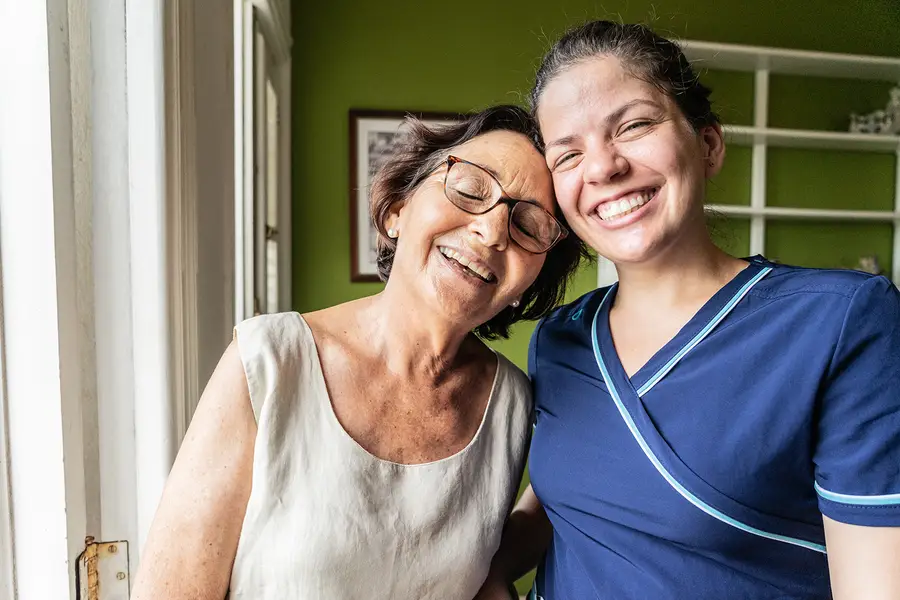
Long term services and supports (LTSS) are essential for older adults and people with disabilities who have physical, cognitive, developmental, or chronic health conditions that may restrict them from caring for themselves and participating in community life. Nearly 20% of adults aged 55 and older struggle with completing basic activities of daily living (e.g., bathing, eating, dressing) or instrumental activities of daily living, which require complex skills (e.g., preparing meals, managing medications, housekeeping).
With an increase in the number of older adults and people living with disabilities each year, millions of Americans have an integral role as unpaid (or informal) caregivers. Caregivers work hard to take care of others, but who will care for the caregivers?
As the operator of the National Alzheimer’s and Dementia Resource Center, RTI has firsthand experience observing and helping caregivers throughout the United States. Caregivers of older adults and people with disabilities often report more physical, emotional, or financial difficulties than adults without these responsibilities. Without support, caregivers can experience burden, which may lead to a decline in their own health and the health of those to whom they provide care. Respite care is one solution that helps support both caregivers and care recipients.
What is Respite Care?
Respite care is short-term relief for caregivers to provide them a break from care responsibilities. Informal respite may be asking a neighbor to stop by to check in on the care recipient while the caregiver is away for a short period of time. Formal respite care is more structured and can happen in a range of locations such as a home setting, medical facility, or adult day center.
A study conducted by RTI for the Administration for Community Living found that the caregivers who have greater caregiving responsibilities are more likely to participate in respite care. Benefits of formal respite care services for caregivers and care recipients include delayed placement of the care recipient into an institutional setting, reduced caregiver depression, and strengthened relationships. Respite care can provide caregivers with opportunities to engage in self-care activities that promote their own health and wellbeing. However, despite the known benefits, respite care is often underutilized. One report found that about 40% of caregivers feel that respite care would be helpful, yet 14% use the service.
Which Current Policies and Programs Support Respite Care?
Respite care programs exist across multiple federal and state health programs, with different eligible populations, levels of care, and other restrictions. Research shows that awareness and use of these programs varies greatly.
At the federal level, health and human services agencies, such as the Centers for Medicare and Medicaid Services (CMS), Department of Veterans Affairs (VA), and Administration for Community Living (ACL), support policies and programs for respite care. Some states cover respite care for informal caregivers of older adults and adults with disabilities who are eligible and enrolled in Medicaid through Medicaid Home and Community-Based (HCBS) Waivers. However, there may be restrictions on the number of hours or costs for caregiver respite.
Additionally, CMS recently launched the Guiding an Improved Dementia Experience (GUIDE) model, an eight-year dementia care model that will test an innovative payment methodology to improve outcomes for people living with dementia and reduce expenditures. As part of this model, participants will receive up to $2,500 per beneficiary per year for respite services in their home, adult day centers, or facilities that provide 24-hour care. The VA provides caregivers an option of home respite and nursing home respite. With nursing home respite, a care recipient is placed in a nursing home for up to 30 days per year so that the caregiver receives a break in caregiving.
An RTI analysis of web survey data from caregivers of veterans revealed that while 73% of respondents in the VA reported being aware of respite care, only 7% reported having used the service. Caregivers of veterans with TBI/PTSD shared that they did not use respite care because they preferred another family member to provide care over a stranger.
The Lifespan Respite Care Program and National Family Caregiver Support Program (NFCSP) provide grants and funding to state agencies to support caregivers. Respite care is often requested as a benefit through the NFCSP. Out of all NFSCP services, which include information about services, assistance accessing supportive services, caregiver education and training, individual counseling, and support groups, and supplemental services, on a limited basis, respite care is the most utilized.
How can States and Providers Improve Uptake of Respite Care?
The ARCH (short for Access to Respite Care and Help) National Respite Network and Resource Center created a Learning Collaborative, which included a roadmap to support states interested in implementing respite actions from the National Strategy to Support Family Caregivers. The roadmap suggests that promoting public awareness campaigns, tracking caregiver needs, and providing financial incentives can help increase respite care uptake.
When people self-identify as caregivers, they are more likely to seek out resources, such as respite care, so the roadmap notes that some states have found success with creating and disseminating videos to decrease stigma around identifying as a caregiver and seeking support. Health care professionals can assess caregiver needs for respite care support through appointment intake forms. Lastly, providing vouchers to pay for respite care has been shown to improve uptake of respite services among informal caregivers.
Conclusion: Caring for Caregivers is Fundamental
Respite care is one of the many services that exist to support informal caregivers. People caring for individuals with significant medical and social needs may benefit more from respite care, including caregivers for people living with dementia. RTI will continue providing expertise and partnership to federal and other clients that are dedicated to supporting the lives of caregivers.
Respite helps caregivers offer support to people in need. At RTI, as we work toward our mission to improve the human condition, we are committed to understanding caregivers and their needs.

